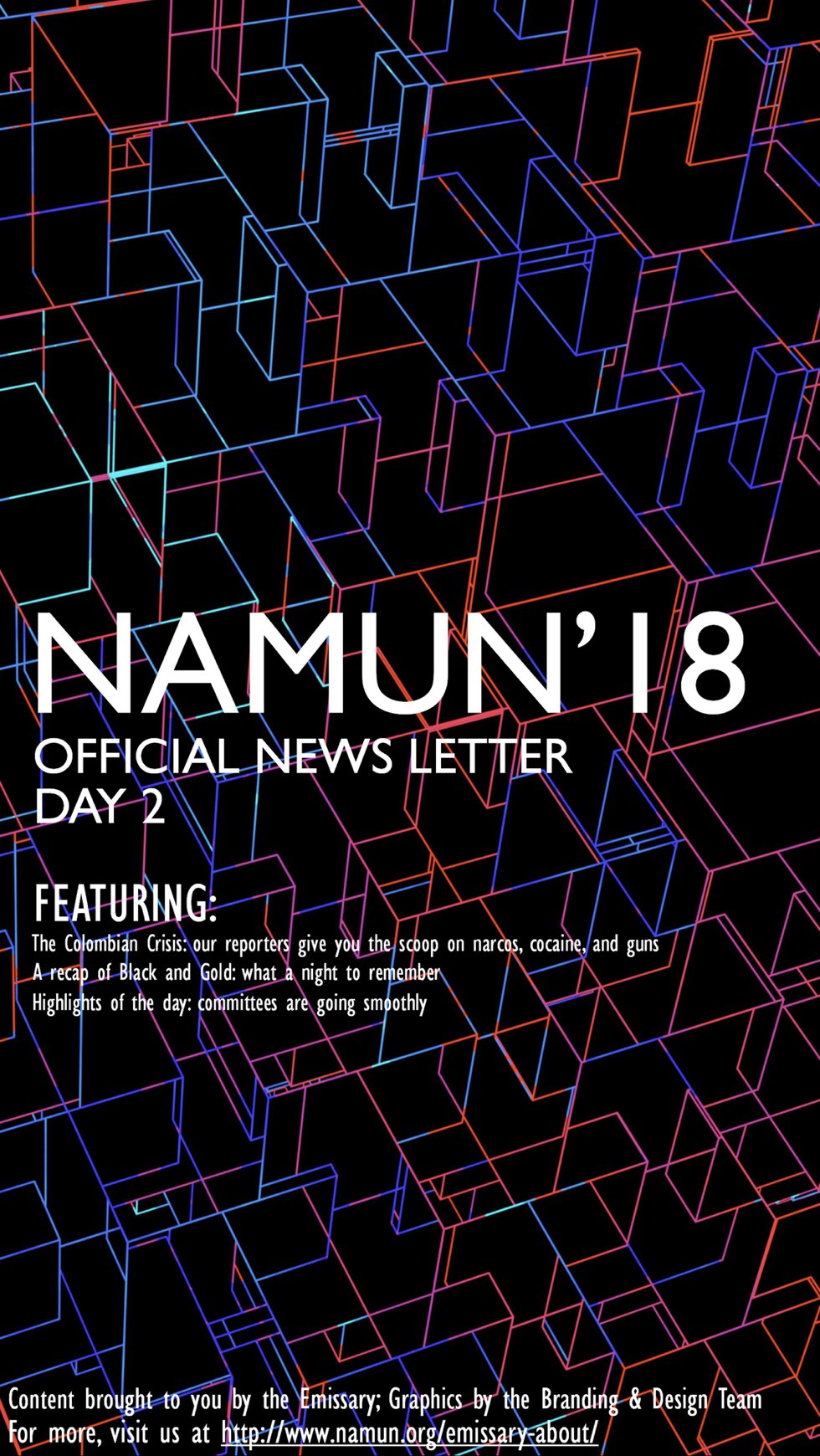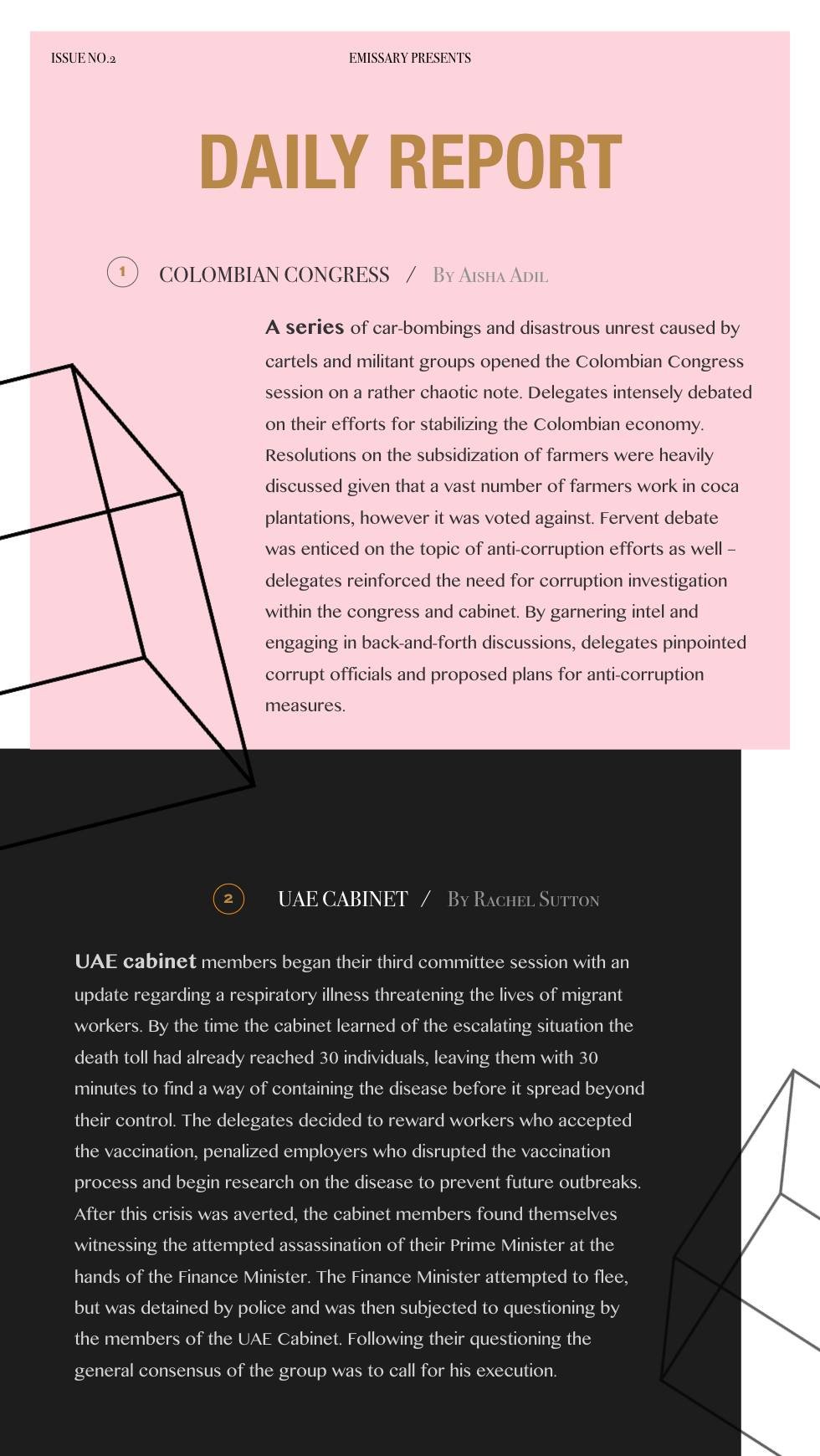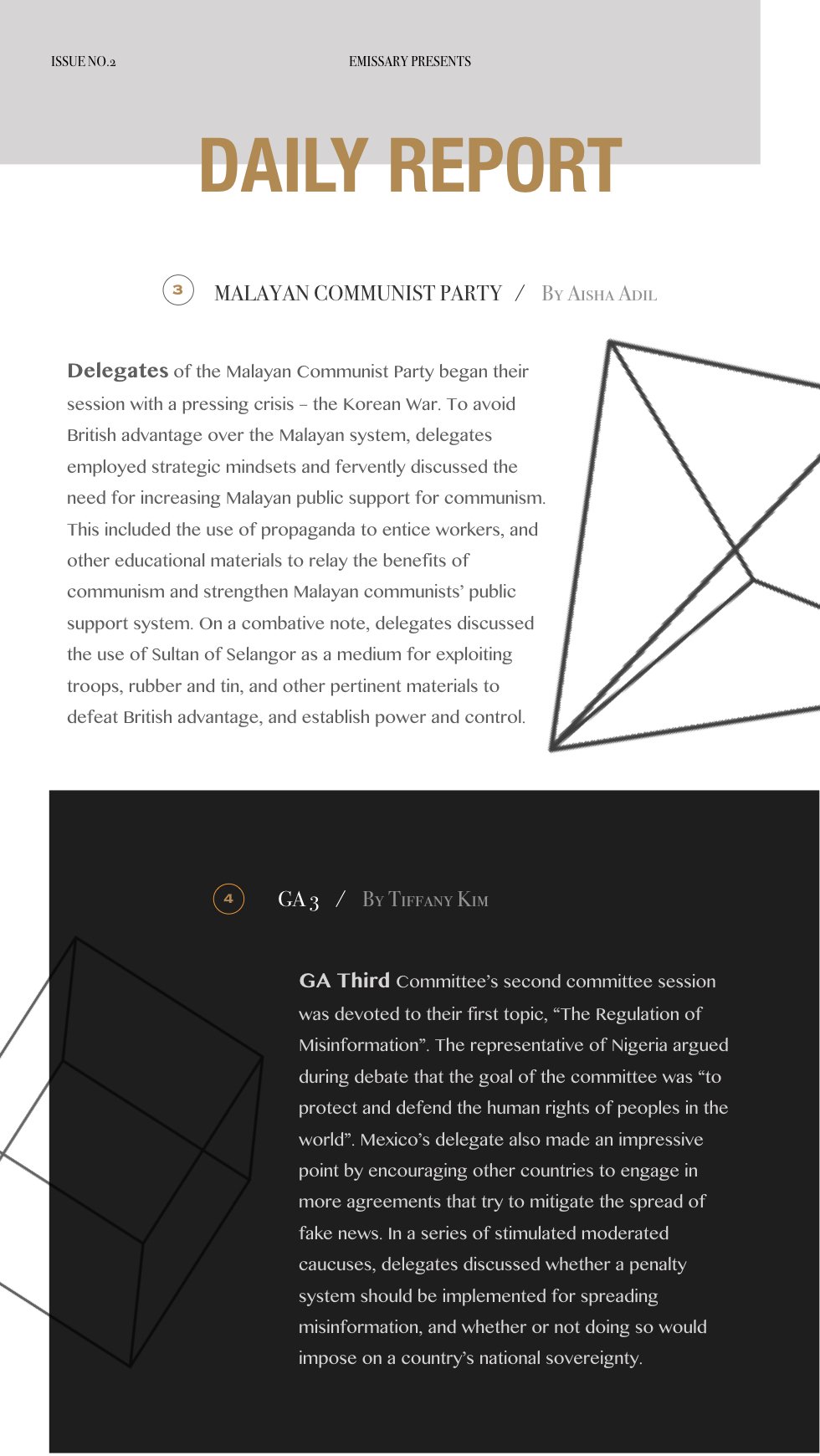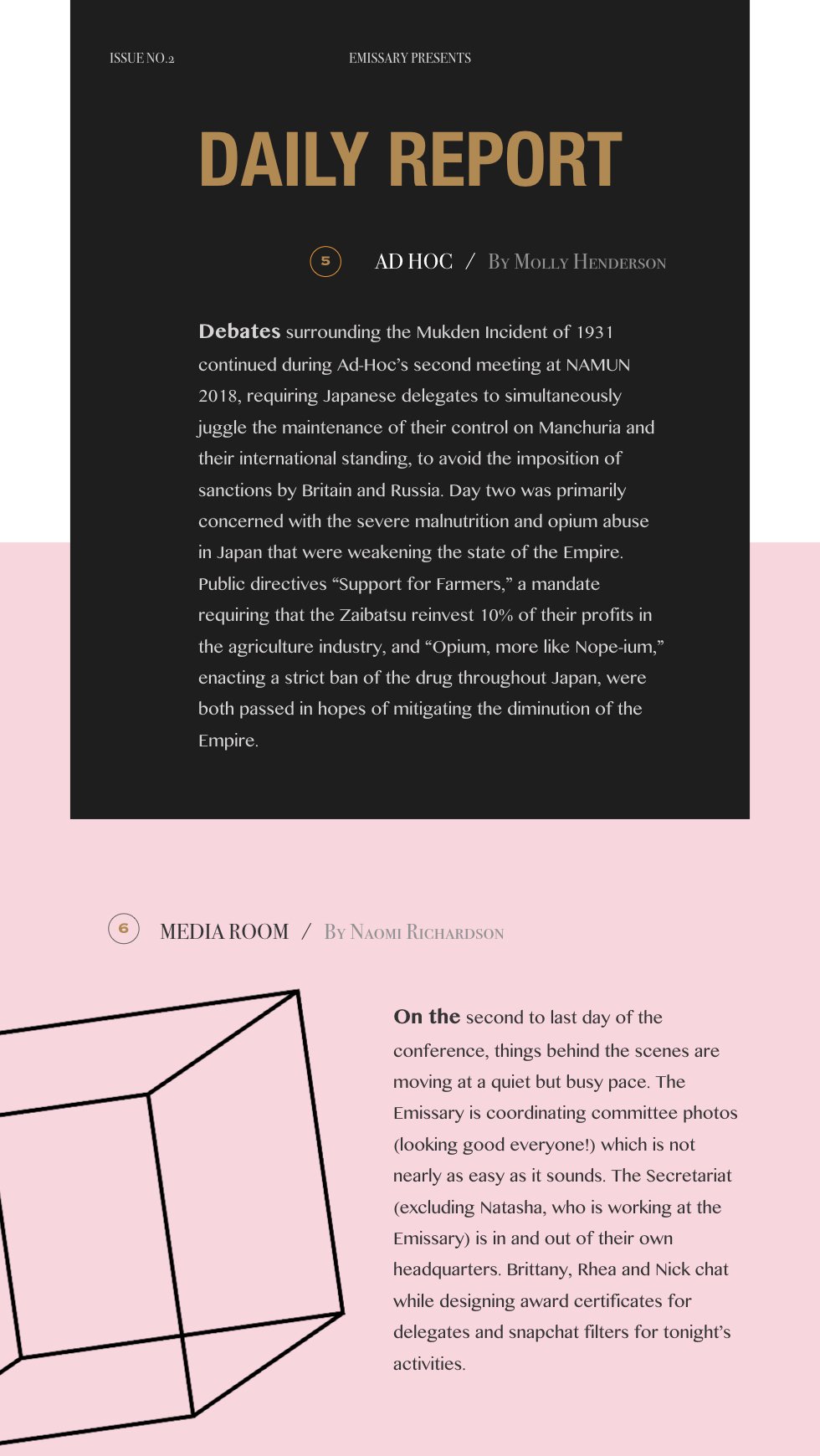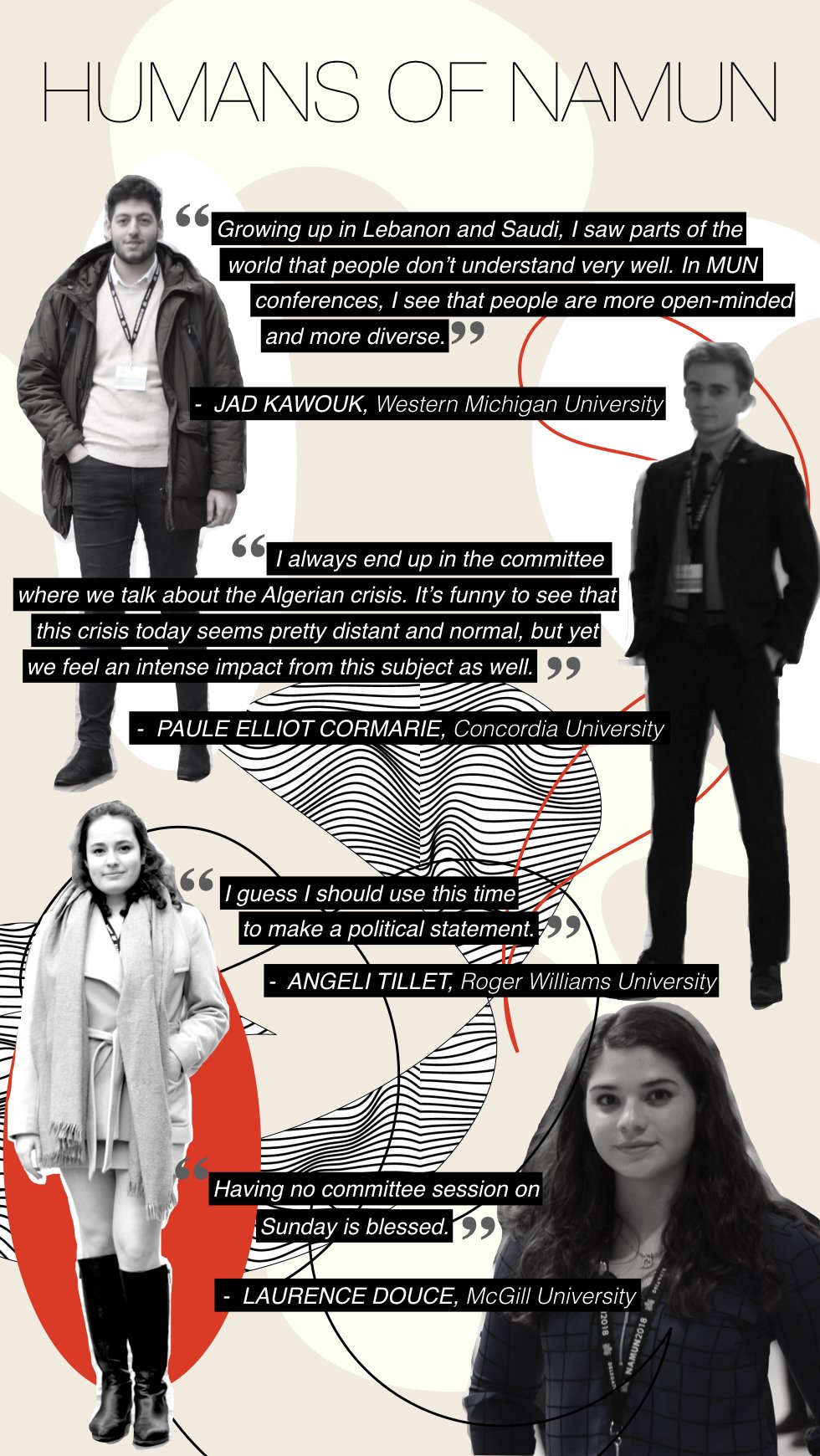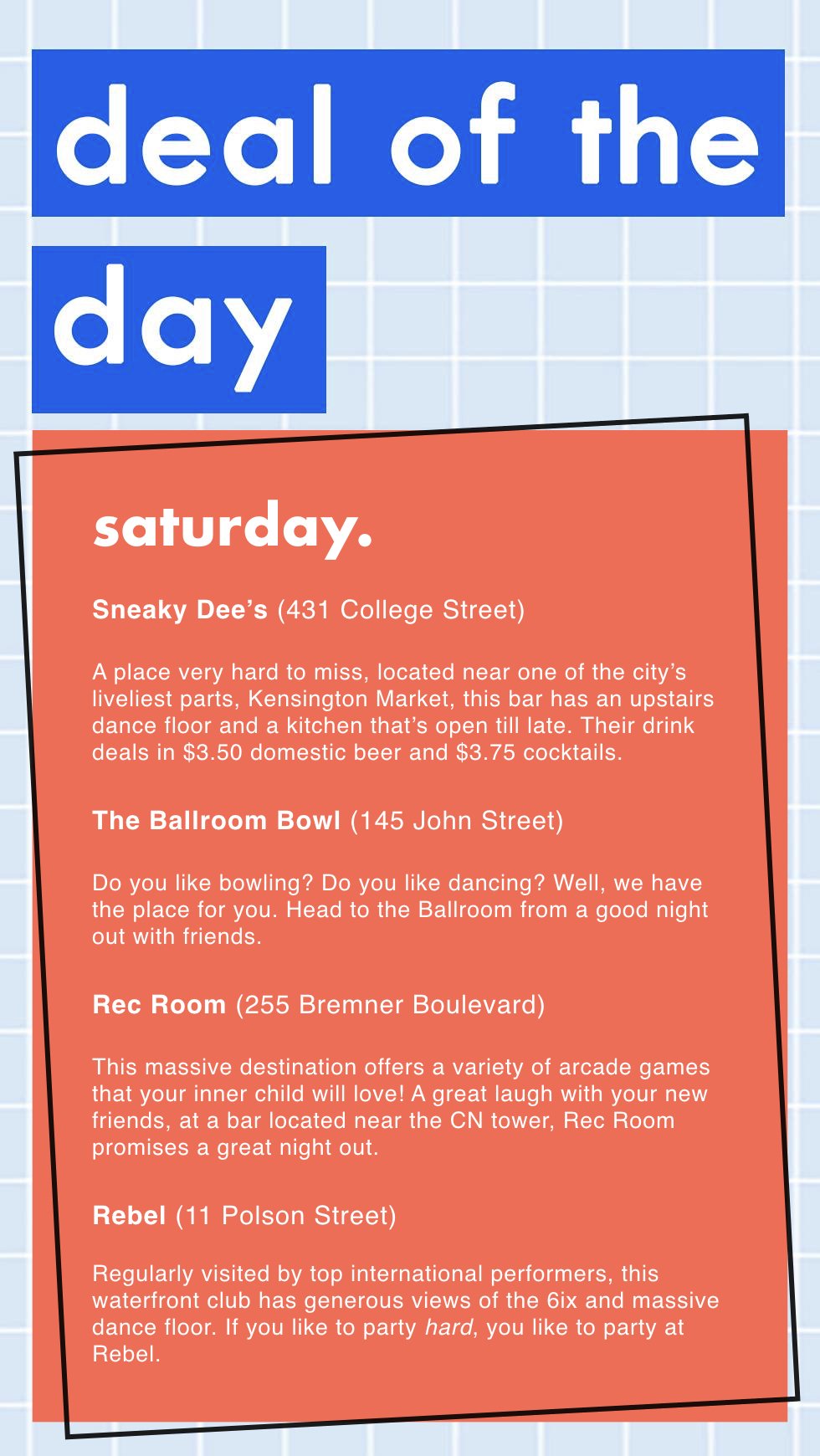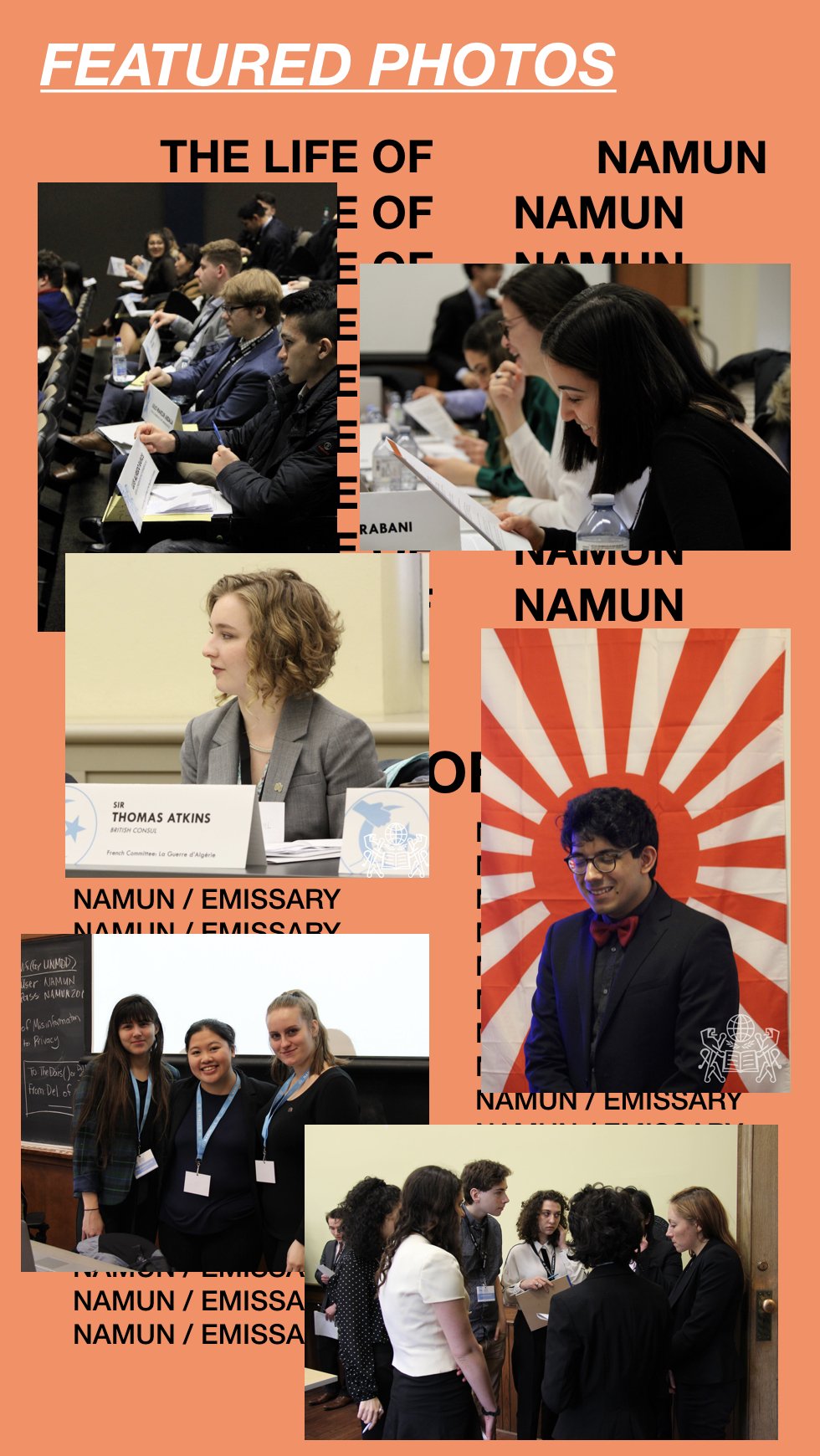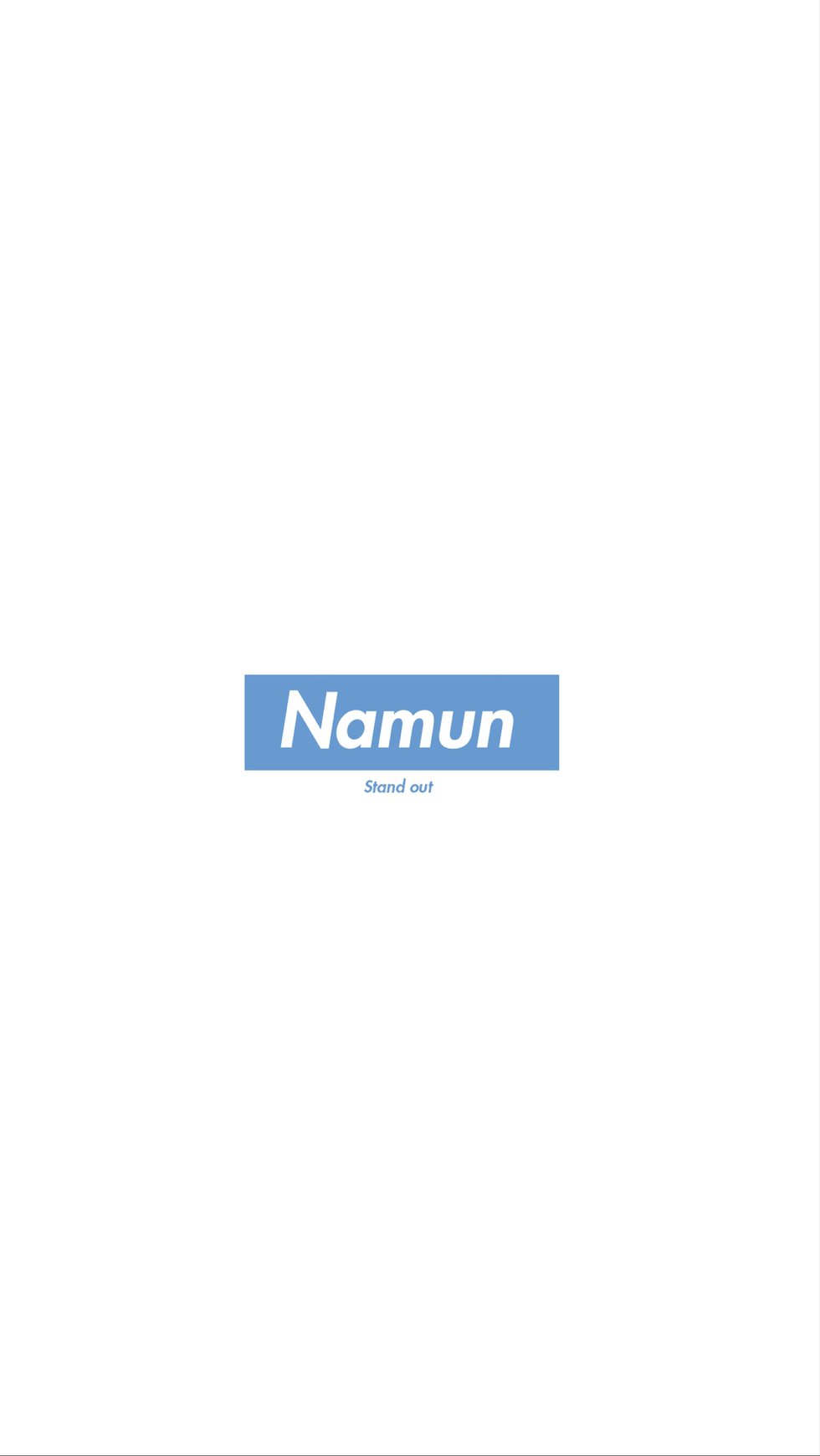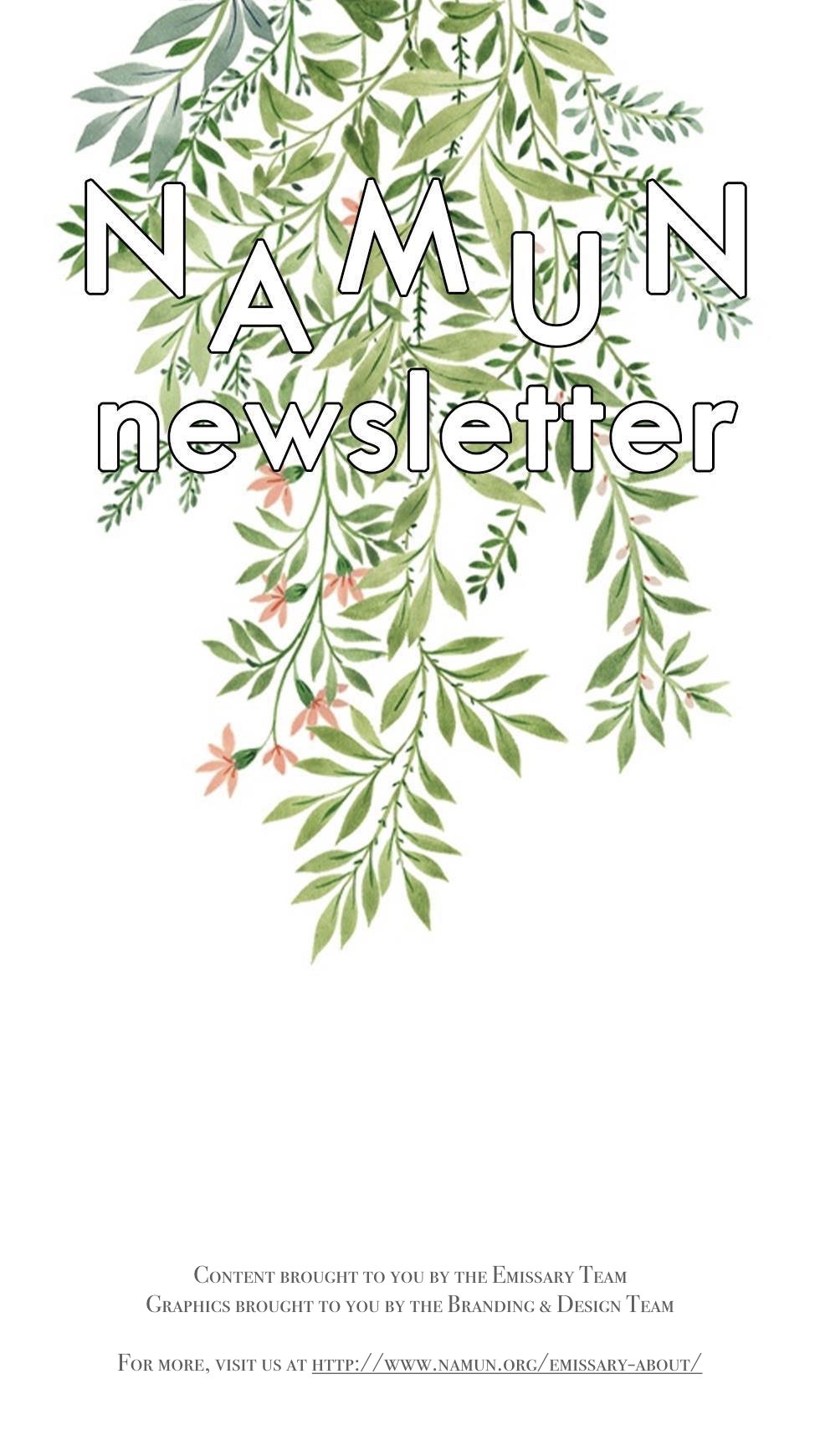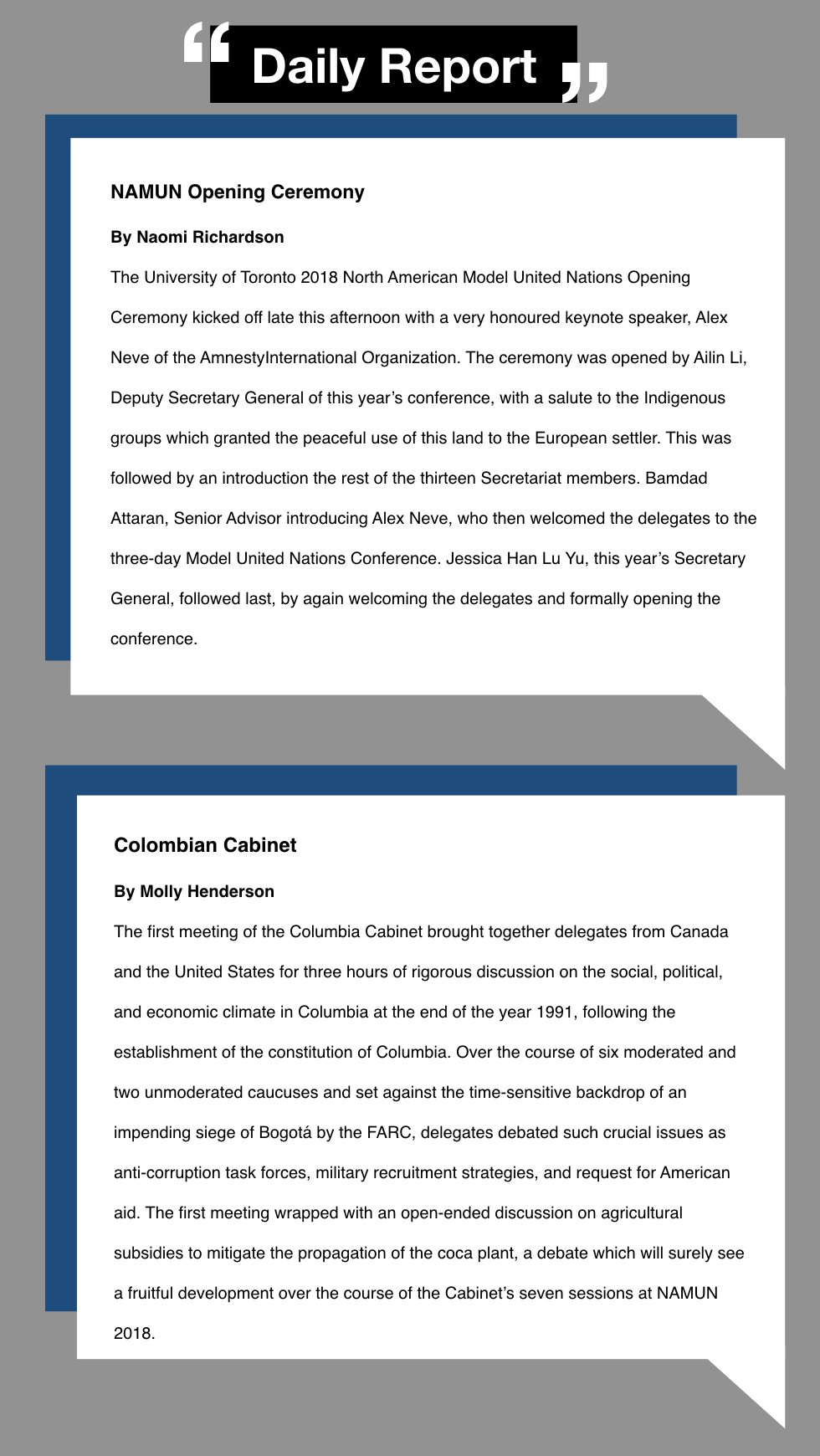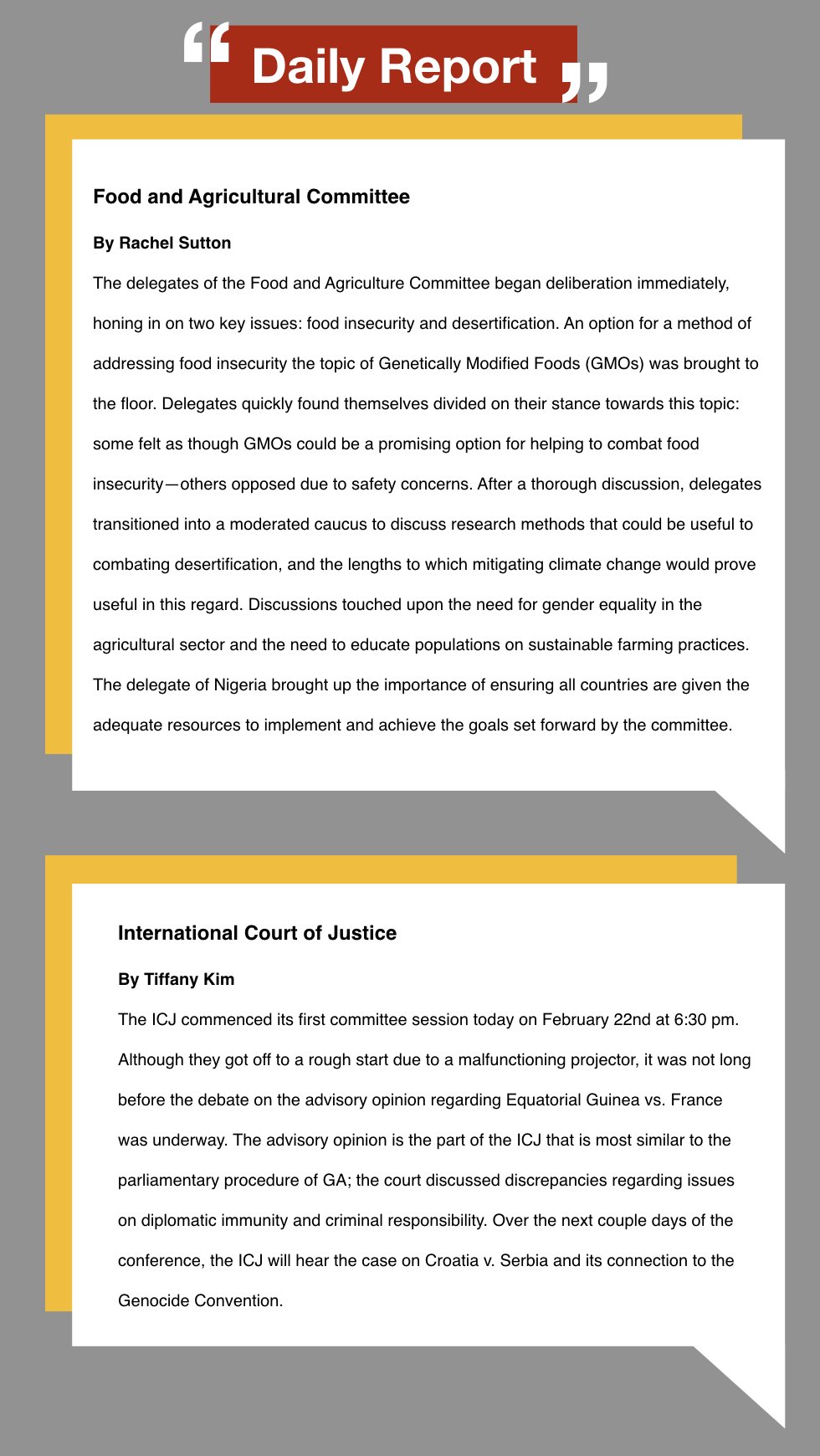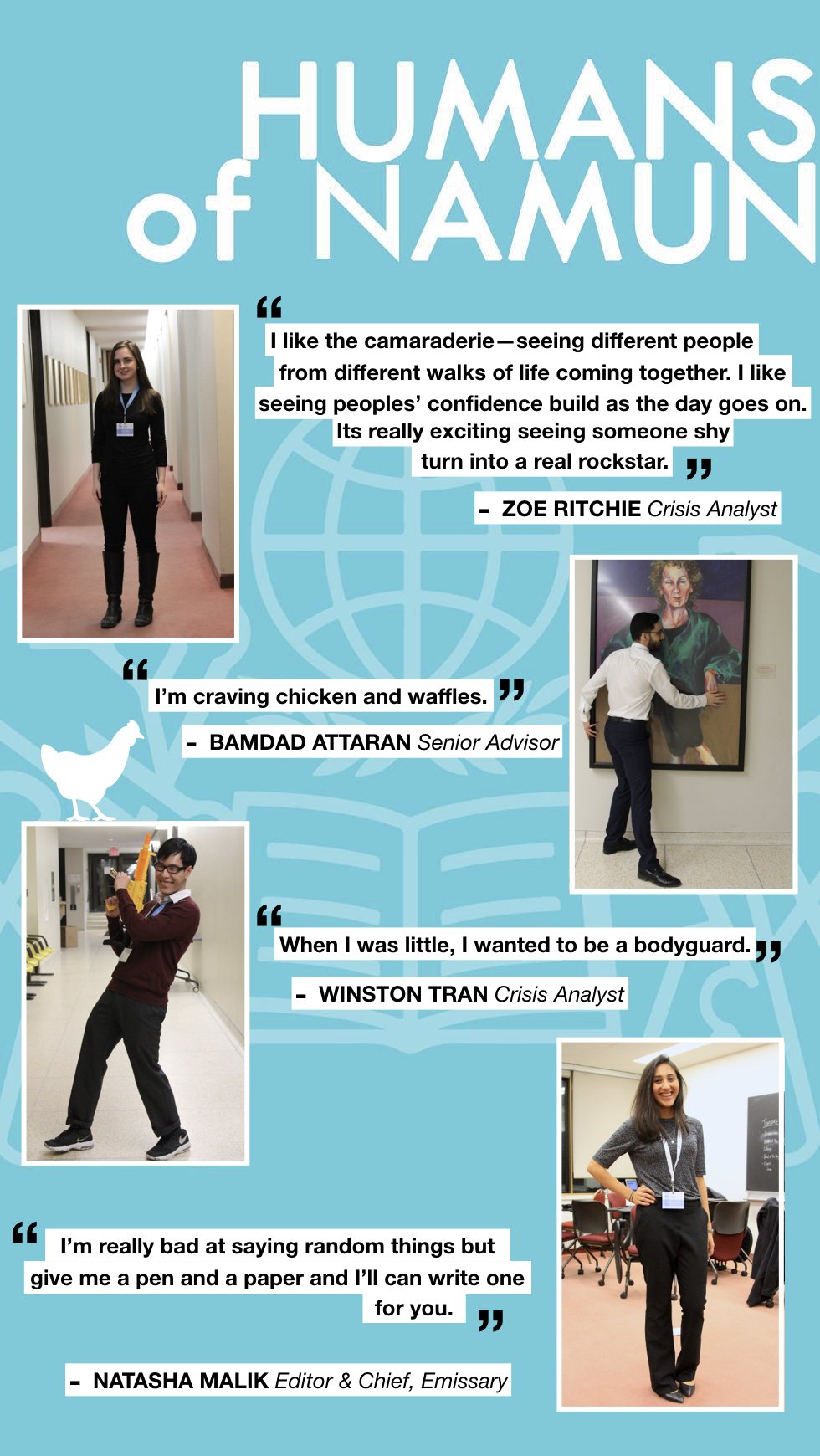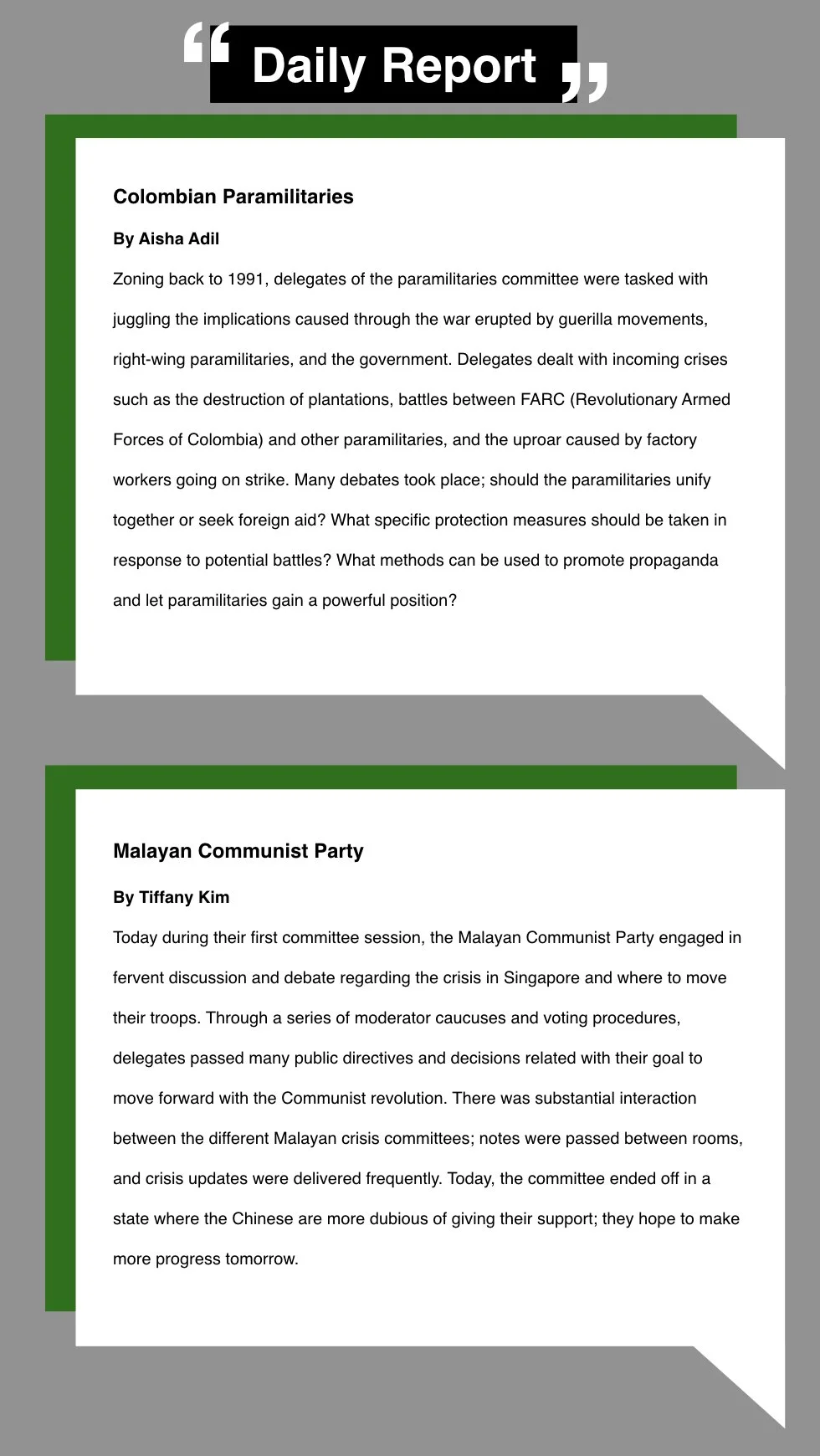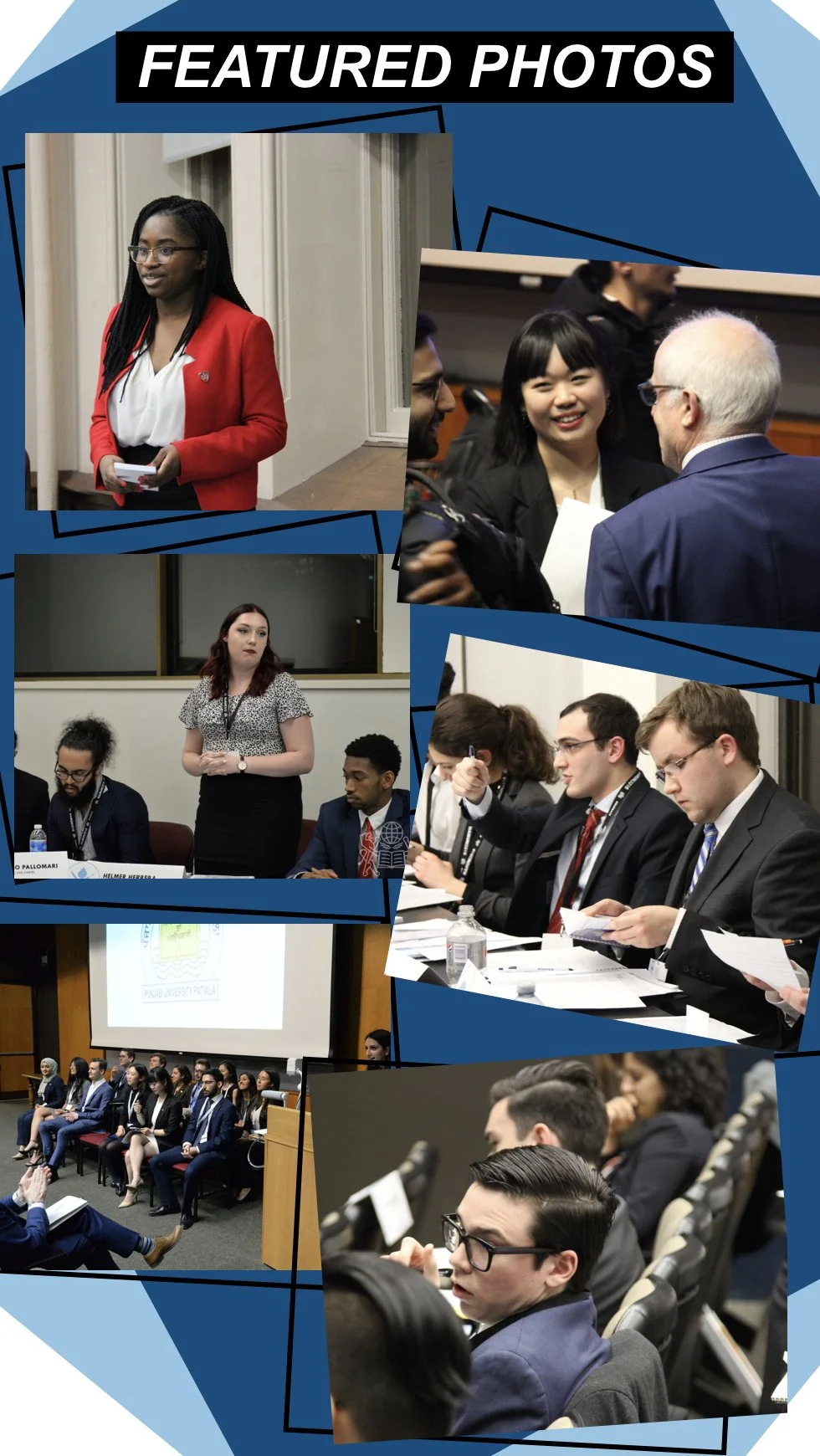A day in the Media Room
A coverage by the media team of the media team
A coverage by the media team of the media team
By Naomi Richardson
It’s the first full day of the 2018 NAMUN conference – committee session runs 10AM to 12:30AM and the halls are quiet, except for the occasional click-clack of shoes as a page or staff member delivers news or updates.
Here we sit at the Emissary HQ – an outline of the NAMUN magazine format takes over the chalkboard, alongside an idea of word counts for article assignments. Media staff are busy updating the NAMUN 2018 Twitter and Facebook pages, creating graphics for the online magazine and putting the finishing touches on committee articles. However, this room at least is filled with a peaceful working atmosphere, thankfully devoid of a stressful anxiety that seems to be present in most television press rooms. Quiet conversations fill the room, sometimes on work, sometimes casual.
Natasha Malik, Editor in Chief of the Emissary, and Rhea Hsu, Director of Branding and Design, are also present with their staff. Thinking of what to write on today’s conference, I started by asking these two what they were doing.
Natasha is busy working on watermarking photos, she says, and coordinating with journalists on which committees to attend. Rhea sits close by, flipping between snapchat filter designs for the events of the next few days. When asked on her role during the conference versus earlier preparation throughout the year, Rhea agrees that she was much much busier in preparation for the conference; its unsurprising, since she is the one who has designed all the nametags and logos for the committees. Proud of her accomplishment and somewhat jokingly, she says “I did everything with my own two hands”.
A favourite place both this year and last, we often get visits from other Secretariat members who need a minute to sit, or need to enlist a second pair of hands to carry boxes, or water – since many of the rooms are steadily gaining in temperature.
One of those who stops by is Brittany Hadley and Bamdad Attaran, second time Secretariat members and this year’s Senior Advisors.
Rhea asks for opinions on her snapchat filter graphics – choosing a good judge, Hadley, one of the most stylish Secretariat members. I asked her too what she often finds herself doing throughout the conference, which I discovered was mostly checking on things, and supporting the conference in whatever capacity NAMUN needs. Bamdad agrees, who I spoke to in the Staff Room, EM119. The Secretariat can often be found there, or often running around and paging paging for committees.
Back at the Emissary, Nickolas Shyshkin stops by. Nick’s role is similar to Bamdad and Brittany’s, as he is often checking in on committees, solving issues as the come up, and responding to staff or delegate needs. Later in the day he will be working on the head delegate meeting and participating in the committee feedback sessions. While I talk to him, Rhea on a whim takes our picture – and Natasha asks us what she should make her quote for our ‘Humans of NAMUN’ page. Am I the only one amused that as the head of the Emissary, she doesn’t know what to say?
First Day at the Colombian Cabinet
Committee believes that a drastic re-organization of the Columbian military and police forces is essential.
Committee believes that a drastic re-organization of the Columbian military and police forces is essential
By Molly Henderson, Journalist
The majority of the first committee session’s caucuses were centred around one specific question: how does a country regain sovereign control that has been appropriated by extra-governmental organizations? Among the numerous solutions offered, one stood out prominently: a drastic re-organization of the Columbian military and police forces was absolutely essential. Re-organizational strategies included increasing police benefits and salary (to reduce incentive to accept bribes from cartels), creating specialized anti-corruption task forces within police units, and bolstering military and police recruitment.
Opposition to these proposals was founded primarily in an aversion to national debt, which would inevitably be accrued following an increase in subsidies for police and military. To this, the delegate representing General Marquez responded: “I would rather leave the next generation indebted than in a country torn to pieces by civil war.” This sentiment was echoed by several fellow committee members.
Another major point of discussion was the state of the country’s infrastructure. Columbia’s Social Services Representative advanced the need to create physical unity in the country through the construction of roads and bridges; this would allow the military to gain access to swathes of paramilitary-controlled regions. It would also create a sense of national cohesion.
Public directives “The Carrot and the Stick” — a two-pronged anti-corruption incentive, “Mining” — land mine removal, and the American-sponsored “Save Bogotá” — a dispatch of three CIA agents and two army battalions to defend the capital, were passed.
First day at the Food and Agricultural Organization
Committee discussions include two key issues: food insecurity and desertification.
Committee discussions include two key issues: food insecurity and desertification
By Rachel Sutton, Journalist
The delegates of the Food and Agriculture Committee began discussion and deliberation immediately, honing in on two key issues: food insecurity and desertification. Many of the delegates present in this committee represent countries whose physical geographies put them at heightened risk for desertification, and tensions began to rise on whether or not this ought to be a central topic of discussion for the committee. As the delegate of India stressed, the temporal component of desertification makes it an urgent topic to address before the situation reaches an irresolvable point.
As an option for a method of addressing food insecurity the topic of Genetically Modified Foods (GMOs) was brought to the floor. Delegates quickly found themselves divided on their stance towards this topic. While some felt as though GMOs could be a promising option for helping to combat food insecurity, other delegates found themselves in strong opposition of exploring the topic, due to safety concerns. Similar hesitant attitudes were exhibited by some delegates regarding turning to advancements in technology as a method of coping with food crises.
After a thorough discussion, delegates transitioned into a moderated caucus to discuss in detail research methods that could be useful to combating desertification, and the lengths to which mitigating climate change would prove useful in this regard. Discussions touched upon the need for gender equality in the agricultural sector and the need to educate populations on what sustainable farming practices would entail, and how to carry them out in their communities. The delegate of Nigeria brought up the importance of ensuring that all countries are given the adequate resources to implement and achieve the goals set forward by the committee.
As the debate began to wrap up for the day delegates focused in on the idea of funding initiatives such as education with the key focusing being on educating women and minorities who are often most involved in agricultural practices. The session ended in a final moderated caucus to allow all delegates to state their position in regards to the situation at hand. We look forward to seeing where the delegates take the discussion tomorrow!
Delegates welcomed to NAMUN2018 at Opening Ceremony
Today marks the start of the North American Model United Nations 2018 Conference
Today marks the start of the North American Model United Nations 2018 Conference.
By Naomi Richardson, Journalist
The opening, given by Deputy Secretary General of Operations, Ailin Li, began with a thanks to the Indigenous land on which the University of Toronto sits, a new statement of recognition becoming more common to open many lectures at events, but moreover an efficient way to state the atmosphere of this year’s NAMUN conference. As was the selection of long-standing Secretary General of Amnesty International’s English Branch, Alex Neve as keynote speaker.
“Where’s my music?” Neve started jokingly, in reference to the jingle that had played as the NAMUN Secretariat Members had been introduced. While good-natured and charismatic, his address to this year’s delegates was serious. It provided a criticism on the promises of the United Nations and international governments in contrast to their actions – or rather, their lack of action – on the same subjects.
Canada as well, Neve argues, has trouble following through with its actions; while often praised for its ‘welcome of refuges and reconciliation of indigenous peoples’ but similar to the other world governments, has issues with following through with its actions and has a clear “wobbly conviction when economic interests are at stake”.
Neve welcomed the delegates to enjoy a “fascinating and demanding and stimulating few days of grappling with international affairs”. He argued that the rise of the global human rights movement and outspoken voices of the public are and will be fundamental in changing the ‘narrow-minded views of world governments’. In answer to a student delegate, he states that “the public is both part of the problem and is the foundation of the solution”.
Following Neve, Jessica Han Lu Yu, Secretary General of this year’s conference. Like the addressers before her, she delves into the meaning of an international organization as she states that “As a simulation of the real thing, I am not sure about how much international order we are really maintaining when we move imagined troops or pass self-written resolutions, but I do believe we are fulfilling the fundamental obligation of a global institution, which is informing the public discourse,”. NAMUN 2018’s opening ceremony has clearly shown what an international government should hold as its values and therefore what NAMUN should reflect.
Delegates, welcome to Toronto and enjoy this year’s NAMUN conference!
The best deals in town
The Emissary brings you a list of all the sweet weekend deals you won’t want to miss out on
The Emissary brings you a list of all the sweet weekend deals you won’t want to miss out on
By Natasha Malik, Editor in Chief of the Emissary
Welcome to Toronto!
In one of the most vibrant and diverse cities in the world, you’d want to know of the right places to go and The Emissary is here to help. Here is a list of hottest places to go, if you are looking for some sweet deals and a good night out here in the 6ix.
Thursday
Madison Avenue Pub (14 Madison Avenue)
Located close to the University of Toronto, this multistory pub is a haunt for many college students. Entrance is at $10, with which you receive a drink ticket. All mixed drinks and domestic beer is priced at $3.50 and each floor offers a different atmosphere. Something for everyone!
Grace O’Malley’s (14 Duncan Street)
An Irish pub with a dance floor and live band, Gracies has no cover for students on Thursdays. Be sure to bring your student ID and dancing shoes. A number of drink deals are in store, including $5 Jäger Bombs!
Friday
Bar 244 (244 Adelaide Street West)
Known for their cheap drink deals for each day of the week, Bar 244 is especially poppin’ on a Friday night. Mixed drinks and domestic bottles at prices at $3 and you are in for a good night out.
Crocodile Rock (240 Adelaide Street West)
Although their $2.50 drink deal ends at 10PM, Croc Rock is located in the heart of Entertainment District and offers a great place to pre.
Fifth Social Club (225 Richmond Street West)
If you are down to dance, this is the place for you. A stylist ex-loft with an upbeat atmosphere, Fifth Social is fun Friday night out in the city.
Tequila Jacks (184 Pearl Street)
A great night spot with massive bars and dance floor. If you like to jam to Top 40 music, you will love the atmosphere and the $4.00 Tequila shots will only make it better.
Dance Cave (529 Bloor Street West)
A college student favourite, this 2nd-storey club plays lively spins of retro and indie rock music. A place that should not be missed!
Saturday
Sneaky Dee’s (431 College Street)
A place very hard to miss, located near one of the city’s liveliest parts, Kensington Market, this bar has an upstairs dance floor and a kitchen that’s open till late. Their drink deals in $3.50 domestic beer and $3.75 cocktails.
Insomnia Restaurant and Lounge (563 Bloor Street West)
A cozy lounge popular for its late night eats and over fifty martinis on offer gives us Martini Thursdays. With $3.00 Jameson and Apple Candy shots, this spot is the perfect remedy for a relaxed night out after an evening of NAMUN.
The Ballroom Bowl
Do you like bowling? Do you like dancing? Well, we have the place for you. Head to the Ballroom from a good night out with friends.
Rec Room (255 Bremner Boulevard)
This massive destination offers a variety of arcade games that your inner child will love! A great laugh with your new friends, at a bar located near the CN tower, Rec Room promises a great night out.
Rebel (11 Polson Street)
Regularly visited by top international performers, this waterfront club has generous views of the 6ix and massive dance floor. If you like to party hard, you like to party at Rebel.
NAMUN Socials
Learn about the socials NAMUN has in store for you this year.
Learn more about the socials NAMUN has in store for you this year
By Petros Kwan
NAMUN is not all work and no play. Especially not when you're in the middle of one of North America's most vibrant cities! Take time out to soak in the 6ix vibes in the city of Drake and The Weeknd with our NAMUN socials.
Black and Gold Cocktail Party at the Hart House Great Hall. Friday 23 February, 8:30pm to 11:30pm
Head over to Hart House's Great Hall on Friday evening for a great time of dancing, a free drink (alcoholic for 19+) and free food (don't worry vegans, we have you covered). Sit back and relax with your fellow delegates. What is Model United Nations without any networking or socializing? Form new friendships in the spectacular setting of the Great Hall, UofT's premier venue for events. The grandeur of the Great Hall will give you many pictures to show off on Instagram and provide content for your Snapchat feed!
NAMUN Pub Night at The Firkin on Bloor. Saturday 24 February, 9:15pm-2am
Great revolutions are plotted over drinks in taverns. Turn the (NAMUN) world upside down over free food and drinks. Enjoy the setting of The Firkin, one of Toronto's most established British pubs, with decor that will make you feel like you're in good old Britain. Similar to the cocktail party, alcoholic drinks will be served to those 19 and above.
Board Game Night at the Marriott Commuter Lounge. Saturday 24 February, 8-11pm
If the nightlife is not your cup of tea, fret not! We have you covered with Board Game Night. Stay at the Marriott Concierge Lounge, enjoy some snacks and kick back with board games after a long day with your new friends! Question your sanity with Cards against Humanity or engage in intense negotiations over a game of Settlers of Catan.
Malayan Communist Party
As part of the Joint Crisis, this committee will consist of the political and military leaders of the Malayan communist movement during the conflict
As part of the Joint Crisis, this committee will consist of the political and military leaders of the Malayan communist movement during the conflict
By Petros Kwan, Journalist
This year’s Joint Crisis, consisting of two committees, will be looking at the Malayan Emergency, significant as a lesser-known symbol of the proxy war that coloured the Cold War. The Malayan Communist Party (MCP), one of the two committees, was founded in the early 1930s as an anti-colonial movement.
The committee’s focus will be the struggles of the Malayan communist group in its attempt to rid Malaya of its British occupiers, and overthrow the old Malay social order. Groups of interest will include the Chinese and other such foreign advisors and supporters of the communist movement.
Committee Chair of the Malayan Communist Party, Danial Liu, tells The Emissary more about himself and this year’s committee.
1. Tell me about yourself.
I am currently a 3rd year International Relations and History student. I am quite lucky to study what I really enjoy, so if you are not tired about discussing international affairs after a week of Model UN, you can always find me in the Malayan Committee room. Like many Canadians, I was not born here. I'm originally from Dalian, a city in northeast China and moved to Canada with my family when I was five years old. In my time outside of school, I have had the privilege to serve as a signals operator with the Canadian Army Reserves.
2. What is your MUN experience? What drives you to keep taking part in conferences?
My first MUN was here at UofT back in high school. It has been a unique experience for me to be on the other side of the dais as the chair. Previously, I've worked with NAMUN as a crisis analyst and moderator and participate as a delegate with UofT's MUN team. What brings me back to MUN, particularly crisis, is the variety of historical topics that we get to explore in depth. Be it as a delegate or staff, having a chance to participate/simulate these historical events is definitely a treat.
3. Introduce your committee and its objectives.
The goal of this joint crisis is to provide the delegates with a simulation of an under-reported yet important event of the 20th century. The Malayan Emergency was among the first communist insurgencies in Southeast Asia, a region that would become one of the key battlegrounds of the Cold War. The delegates will get a chance to act out this from the perspective of the Communist leaders and test out their strategy in an effort to force their counterparts in the Executive Council out of Malaya. This is one of history's big "what-if" scenarios and I am excited to see what the delegates will bring to the table.
4. What are your expectations of your committee’s delegates, and any words of advice?
If I have had one from MUN its to enjoy your time. Simple as that. The goal of NAMUN is to provide the delegates with a memorable experience and I hope you will enjoy it as much I have. We at the Malayan Communist team hope you have an exceptional time here in Toronto and get a chance to explore our amazing city.
5. Would you rather face one horse-sized duck or a hundred duck-sized horses?
Duck sized horses, they sound like they would make a cute pet. A horse sized duck will eat a person and have room for more.
The NAMUN conference will be held at the University of Toronto from the 22nd to the 25th of February. Read more of the Emissary’s coverage on this year’s committees here.
French Committee: Algerian War of Independence
This year’s French Committee will focus on addressing the cruelty of the war for Algerian independence.
This year’s French Committee will will focus on addressing the cruelty of the war for Algerian independence
By Molly Henderson, Journalist
This year’s North American Model United Nations (NAMUN) conference will see a variety of committees, including the French Committee on the Algerian War of Independence. Delegates participating in this committee will tackle debates on one of the most brutal and bloody conflicts in the history of French colonization. The focus of the session will be the cruelty of the war for Algerian independence, France’s political struggles and foreign intervention during the conflicts.
The background guide aims to place delegates in the historical context of November 2nd, 1954, the day after the outbreak of the Algerian war of independence. Such a context will enable the French Committee to examine the nature and legitimacy of colonialism under international law, then a nascent topic at the United Nations.
The Committee will discuss key issues of the colonialism debate, such as the mistreatment of indigenous populations, the French government’s appropriation of Algeria’s natural resources, the use of guerrilla warfare by Algerian rebels, and the recourse to torture and other crimes against humanity by French forces. Delegates will gain a better understanding of the history of colonialism, as well as the extremely complex procedure required for a nation to regain its independence.
Besides drawing up a detailed background guide for her committee, chair Ece Yucer has been hard at work all year, participating in simulations and familiarizing her staff with the procedural logistics of a model United Nations conference.
NAMUN runs from February 22nd to 25th at the University of Toronto. Read more of the Emissary’s coverage on this year’s committees here.
The International Court of Justice: Croatia vs. Serbia
Returning for its second year, the ICJ will hear 1999 case, Croatia v. Serbia
Returning for its second year, the ICJ will hear 1999 case, Croatia v. Serbia
By Tiffany Kim, Journalist
On February 22nd at the University of Toronto, delegates from around the world will gather for day one of the North American Model United Nations (NAMUN). This collegiate-level conference will feature a total of sixteen committees, one of which will be the International Court of Justice. The ICJ is generally newer to the Model UN world in North America, and this reflects President Allen Wang’s personal objective to “establish the ICJ as a consistently repeating committee here, with participants buying into the idea of stimulating an international court in a realistic but approachable way”.
This year, the court will hear the case on Croatia v. Serbia and delve into the exploration of humanitarian law, and the troubled history of the Balkan War as well as the aftermath of the collapse of Yugoslavia. A team of two advocates will represent each of the states. Other important members of the court will include three officers as well as the judges that will hear the case, ask relevant questions, deliberate with one another, and finally come up with a verdict.
The court also hopes to debate an advisory opinion, which is a court’s nonbinding interpretation of law regarding a topic of international legal significance. More about this can be found in the background guide on the committee website, along with the impressive body of work that advocates have compiled under the guidance of Wang and Deputy-President, Jerry Qiu, in preparation for the conference.
Wang warns the delegates to take copious notes during the hearing as the procedure will undertake a very different style from a typical committee debate. He tells the Emissary that, “There are no caucuses, no speaker’s lists, none of the parliamentary procedure (s)” that one would expect to see in a usual debate. Instead, it is crucial to pay attention to the documents and issues raised by the advocates.
The ICJ expects to see participants from a variety of academic backgrounds, each with their own unique experiences with mock trials and legal traditions.
“I just hope they [delegates] gain a different perspective on dispute resolution in international relations and the real strengths and weaknesses of the ICJ as an international legal mechanism”, Wang tells us.
The conference will run for a duration of four days, beginning on the 22nd and coming to a close on the 25th of February. The Emissary is looking forward to the ICJ’s participation.
Independent Commission of Experts: Switzerland's Armed Neutrality
Committee Chair, Sammi Chan, talks to The Emissary about the Bergier Commission
Committee Chair, Sammi Chan, talks to The Emissary about the Bergier Commission
By Petros Kwan, Journalist
Next week, delegates from around the world will be attending the North American Model United Nations conference, held at the University of Toronto. This year, the conference consists of sixteen committees, debating on a number of political issues. One such committee, the Independent Commission of Experts, otherwise known as the Bergier Commission, will investigate Switzerland’s domestic and international policies during the World War II. Policies discussed include the refugee policies of Switzerland, Swiss foreign trade relations, and asset transactions with Nazi Germany.
Committee Chair, Sammi Chan, tells The Emissary more about herself, the committee and the preparations in the run-up to the conference.
Tell us about yourself.
I was born in Malaysia, grew up in Hong Kong, spent a while in Switzerland and Malaysia, before coming to Canada to attend high school in Hamilton, Ontario. I guess that you can say that I am like rojak*. When I am stressed, I like to go to Early Bird Brew on Queen Street West to read and have a coffee. Check it out if you don’t mind surly service! My friends and I also run a viral Instagram food account - follow us at @foodventurer.to. I think there’s a constant food theme running through my life here.
Give us a rundown of your Model UN experience.
I started doing MUN in grade 12. My first conference was Change the World MUN at the UN headquarters in New York City. It was one of the craziest moments of my life - it gave me the ambition to become a UN committee chair one day. It was also one of my more embarrassing moments - I fell asleep while listening to one of the keynote speakers (world politics is hard work). In my first year at UofT, I was the vice director for the World Health Organization committee at UTMUN, and also a crisis analyst at NAMUN2017. NAMUN 2018 is my first time chairing, and I am very excited!
Let’s get down to business. What is the Bergier Committee?
The Bergier committee focuses on investigating the extent of Switzerland's involvement in WWII. Reputedly neutral, Switzerland was covertly involved in dealings with Nazi Germany. We will also be looking at Swiss involvement in depositing Nazi war loot, as well as Swiss crimes against humanity.
How do you ensure that things run smoothly in the committee? Run us through the preparation process.
Our team has been working really hard to make sure the committee will run smoothly. We have been holding simulations weekly to test out crisis materials.
What are your expectations of the delegates? Do you have words of wisdom before the conference begins?
Not only do I hope that delegates will find this committee academically challenging and stimulating, but I also hope they will have a lot of fun! This committee is about working together to creating our own ICE report. It will be hard, but myself and the crisis team believe that it will be a memorable committee! On behalf of all the staff in the ICE, we wish every delegate the best of luck and we can't wait to meet you guys!
One last question - as a foodie, what would your last meal be?
Any meal cooked by my mum, with bubble tea.
The NAMUN conference will be held at the University of Toronto from the 22nd to the 25th of February. Read more of the Emissary’s coverage on this year’s committees here.
*rojak is a popular Malaysian street food that incorporates a huge variety of fruit and vegetables that come together with peanut sauce to create a savoury salad. To be rojak is to be a product of many diverse experiences.
Arms Trade Treaty
Committee will debate 2012 draft treaty on the arms trade.
Committee will debate 2012 draft treaty on the arms trade
By Ilya Bañares, Senior Copy Editor
In just a couple of weeks, the North American Model United Nations (NAMUN) conference will take place at the University of Toronto, and will gather hundreds of delegates from across the world in one place. One of the committees in particular, the Arms Trade Treaty, will take a different format: a historical committee, it will involve countries negotiating an agreement of utmost importance.
“Our committee is a re-enactment of the negotiations which took place at the United Nations during the summer of 2012 with regards to controls on the international arms trade,” Co-Chair Raluca Petrut told The Emissary. The treaty, back in 2012, was the first legally binding treaty negotiated by the UN regarding the regulation of the arms trade.
Petrut, however, also highlighted that to this day, the treaty was ultimately a failure, as many countries and member-states had not signed the document. “However, with this committee we are challenging delegates to go back in time and negotiate a stronger treaty,” Petrut said. “One that effectively integrates all of the complex and conflicting interests of various countries while also bringing to the table a new and powerful plan on restricting the illegal flow of weapons and any sales of arms to vulnerable areas.”
The committee mechanics are slightly different than that of a regular General Assembly; delegates will be debating on the actual treaty itself, and will be negotiating amendments that would make the document more amenable to countries.
With the unique format of the committee, the Co-Chairs are underlining the importance of coming to the conference prepared. In an email to The Emissary, Co-Chair Nicholas Klid said, “However, with this committee we are challenging delegates to go back in time and negotiate a stronger treaty–one that effectively integrates all of the complex and conflicting interests of various countries while also bringing to the table a new and powerful plan on restricting the illegal flow of weapons and any sales of arms to vulnerable areas.”
The Co-Chairs have been hard at work, writing the background guide during the summer and perfecting it during the academic year. “In sum, delegates must come to the conference prepared to debate and bring their enthusiasm with them to ensure success is achieved at NAMUN 2018,” Klid said.
NAMUN begins in less than a month at the University of Toronto. Follow the Emissary’s coverage on this year’s committees here.
The United Arab Emirates: The Cabinet
Committee looks at solutions for crises that threaten the UAE’s financial prosperity
Committee looks at solutions for crises that threaten the UAE’s financial prosperity
By Natasha Malik, Editor-in-Chief of the Emissary
Later this month, delegates from around the world will be attending the North American Model United Nations, held at the University of Toronto. The collegiate-level conference will consist of a total of sixteen committees, one of which will be the United Arab Emirates Cabinet.
The UAE Cabinet, filled with leaders of the nation’s seven Emirates, will look at the problems that threaten the growth of the state’s rapidly developing economy. Issues being discussed will include the country’s reliance on the petroleum sector, problems faced by migrant workers in the state and, the more recent Gulf Cooperation Council and Qatar crisis that broke out in the summer of 2017.
Committee Chair, Semira Duman, discusses the GCC/Qatar crisis with the Emissary, emphasizing the impact that the issue has had on the diplomatic relations between the Gulf states, and on Qataris living in the UAE.
“I would like the committee to focus on this issue first, and then move on to other important issues such as the UAE’s dependency on the migrant workforce, and the challenges faced by migrant workers including low pays, abuses, and lack of labor protection.”, Duman tells us.
Through these debates and discussions in the committee, Duman hopes the delegates will not only come up with meaningful and doable solutions in their directives but will also achieve self-growth.
She tells the Emissary that, “I want them to make connections with other delegates, to get together with them and work on persisting issues. I want them to have fun and practice public speaking, and while this may not be easy for everyone, this conference is one place where you can really push yourself to think, engage and practice certain skills.”
Duman, alongside Director of Specialized Agencies, Ines Kortebi, has been working hard to put together the background guide and train the committee staff in regular meetings.
“During these meetings we come up with possible crises that we could trigger during the conference, and discuss committee mechanics. It’s a team work, and it’s important to have everyone’s input as to how we want the committee to run.”, she tells us.
The NAMUN conference will be held at the University of Toronto from the 22nd to the 25th of February. Read more of the Emissary’s coverage on this year’s committees here.
Which NAMUN 2018 Secretariat Member are you?
Ever wanted to know which NAMUN 2018 Secretariat member you are most like? Take a quiz and find out!
By Naomi Richardson, Journalist
Ever wondered which one of the fourteen North American Model United Nations 2018 Secretariat members is most like you? Think you might be as casual as Rhea, or perhaps as charismatic as Alec? Do you tend to spend your Friday night more like a Nick or a Jessica? Click here to take the quiz and find out!
General Assembly 4th Committee: Special Political and Decolonization
Committee to look at the core mandates of peacekeeping, decolonization and self determination
Committee to look at the core mandates of peacekeeping, decolonization and self determination
By Rachel Sutton, Journalist
During the upcoming North American Model United Nations conference, delegates from across the world will come together to form the General Assembly 4th Committee: Special Political and Decolonization (SPECPOL). In this committee they will tackle political, real world issues, which range from challenging the authority of peacekeeping to assessing the level at which colonization has been imposed on the Kurdish people.
One of the core topics of The Fourth Committee is the instances when, and extent to which, excessive force should be authorized by the United Nations in peacekeeping missions. Co-Chair Angela Hou shared with The Emissary that “[I] hope our delegates can walk away from NAMUN having learned about and experienced the difficulty of negotiating such contentious topics, and appreciate the "messiness" of these issue areas”.
The background guide provides in-depth examples of instances when force has been used in peacekeeping missions versus ones where it has been omitted, and provides justifications and weaknesses for each case. Delegates will be tasked with using this information to determine the legitimacy of how various nations define peacekeeping, and whether it should be thought of as the UN’s precedent or exception in missions.
The other issue SPECPOL confronts is the colonization of the Kurdish people and their effectiveness to self-determine through existing systems and structures in the region. Co-Chair Brandon Yih stressed the importance of the Iraqi Kurdistan independence referendum that took place this past September saying, “[it] is a pivotal issue that will affect how delegates attempt to resolve or mediate the situation”.
In the background guide, Yih touches on the importance of delegates keeping up with the constantly evolving situation in Kurdistan, so that they are up to speed on the implications of events still unfolding in the region. All these change and instabilities could either improve, or worsen, with the involvement of the UN and implicated nations the guide points out.
Both Co-Chairs have been hard at work since the summer to preparing background guides, becoming well versed in NAMUN’s procedures, and participating in simulations to work out the finer logistical details of the conference to make sure nothing but excitement is felt in the lead up to the conference. NAMUN runs from February 22nd to 25th at Victoria College at the University of Toronto.
General Assembly 3rd Committee: Social, Cultural, Humanitarian
Committee to look at the regulation of misinformation, right to digital privacy
Committee to look at the regulation of misinformation, right to digital privacy
By Ilya Bañares, Senior Copy Editor
At the upcoming February conference of the North American Model United Nations (NAMUN) at the University of Toronto, delegates from around the world will gather to debate hot-button topics, like the spread of fake news and the inherent human right to privacy online, in the Social, Cultural, and Humanitarian Committee.
Co-Chair Marianna Kalaczynski, who is pursuing a degree in Polish Studies, History, and English, told The Emissary that the committee will determine and establish, “what the boundaries, or lack thereof, are in regards to information that is collected and retained by states, governments, corporations, and organizations and how it ought to be respected.” She also highlighted that a main topic that will be discussed is under what circumstances can privacy be breached.
In the background guide, Kalaczynski brings up the examples of the outbreak of the Ebola virus and the 2016 United States presidential election to underline the game-changing role misinformation, or more informally, “fake news,” can play in the political discourse.
In an interview with The Emissary, Amanda Ng, the committee’s other Co-Chair and who is studying Ethics, Writing and Rhetoric, and Religion, said, “We will be engaging in debate on the notion of privacy itself; digital privacy at a time of deep concern for state security and public safety; and the responsibility of business and corporations in upholding the right to privacy.”
Ng wrote in the background guide that though the advent of the digital age has given rise to increased popular participation in democratic governance and processes, this has also given way to many abuses that could take place, including mass government surveillance.
Both Chairs wish incoming delegates all the best, and mentioned hoping to see many of them achieve a greater sense of value of international organizations, gain public speaking skills, and engage in a rigorous and meaningful debate on the topics at hand, among others.
The Co-Chairs have been preparing the academic content of the committee for months prior to the conference, in order to be ready for the delegates. NAMUN begins in four weeks on February 22 at Victoria College at the University of Toronto.


